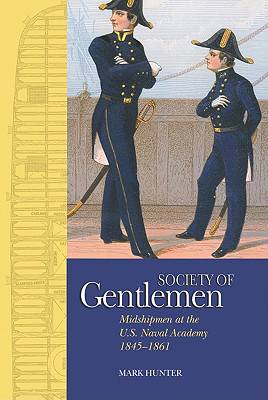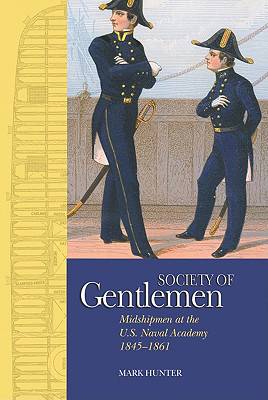
Door een staking bij bpost kan je online bestelling op dit moment iets langer onderweg zijn dan voorzien. Dringend iets nodig? Onze winkels ontvangen jou met open armen!
- Afhalen na 1 uur in een winkel met voorraad
- Gratis thuislevering in België vanaf € 30
- Ruim aanbod met 7 miljoen producten
Door een staking bij bpost kan je online bestelling op dit moment iets langer onderweg zijn dan voorzien. Dringend iets nodig? Onze winkels ontvangen jou met open armen!
- Afhalen na 1 uur in een winkel met voorraad
- Gratis thuislevering in België vanaf € 30
- Ruim aanbod met 7 miljoen producten
Zoeken
A Society of Gentlemen
Midshipmen at the U.S. Naval Academy, 1845-1861
Mark C Hunter
Hardcover | Engels
€ 39,95
+ 79 punten
Omschrijving
A Society of Gentlemen is a social history of US naval officer education at Annapolis, Maryland from 1845 to 1861. By combing statistical and scholarly analysis based on original research, it reveals that through the Naval Academy, the US Navy exhibited signs of a professional organization during the antebellum era. The Naval Academy, founded in 1845, indoctrinated potential officers into the navy through a more structured form of education than used previously as the navy assessed students on academic and practical seamanship skills, their conformity to naval law and discipline. By 1850, the Academy also showed great concern for officer recruits taken directly from civilian life, who needed a longer period of nurturing before going to sea, and established summer cruises and school ships to introduce them to naval life. Henceforth, Annapolis midshipmen went to sea under the supervision of Academy officials who taught them practical seamanship, navigation, and the command skills required of professional naval officers, to complement their shore-based training. The Civil War interrupted this process of educating officers, a large number of students failed to graduate, and a significant number of graduates actually spent little time in the navy. But those who remained were the professional officers who contributed to the Navy's exploits after the Civil War: men like Stephen Luce, George Dewey and Alfred Thayer Mahan. It is no surprise that such men later established more fully the dynamics of a naval officer profession later in the century. This history is based on letters to Academy officials from students and the autobiographies of famous naval officers, to expand upon statistical data dealing with wider student backgrounds.
Specificaties
Betrokkenen
- Auteur(s):
- Uitgeverij:
Inhoud
- Aantal bladzijden:
- 264
- Taal:
- Engels
Eigenschappen
- Productcode (EAN):
- 9781591143970
- Verschijningsdatum:
- 15/04/2010
- Uitvoering:
- Hardcover
- Formaat:
- Genaaid
- Afmetingen:
- 152 mm x 229 mm
- Gewicht:
- 476 g

Alleen bij Standaard Boekhandel
+ 79 punten op je klantenkaart van Standaard Boekhandel
Beoordelingen
We publiceren alleen reviews die voldoen aan de voorwaarden voor reviews. Bekijk onze voorwaarden voor reviews.











